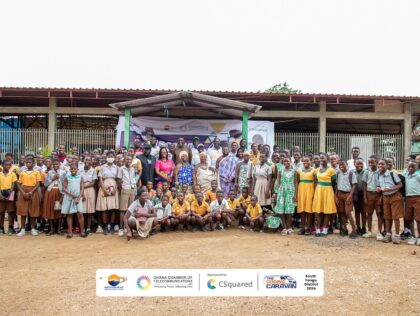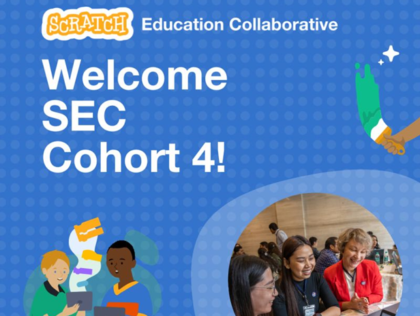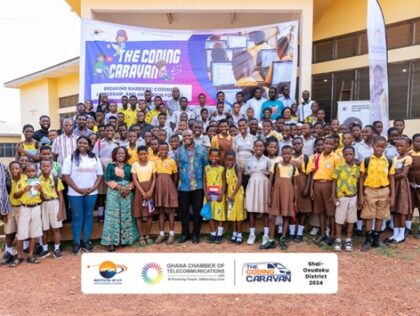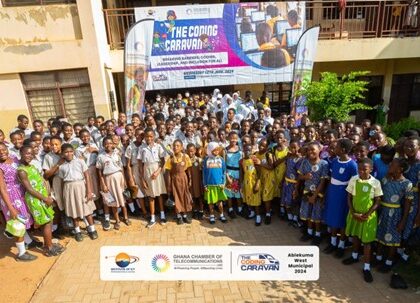…. through its Digital Design and Creative Coding Hub project
Coding has exploded in recent years, changing from something used in computer games and the occasional electronic device to something which shapes how we live in the modern world. This means that now is an excellent time for learning how to code.
Coding is an exciting new field that presents a world of opportunities for people who are willing to learn. Despite what you may have heard, learning to code is not that tough, especially when you compare it to the skills that are required to get the most skilled jobs. A few months of hard work will leave you confident in at least one programming language. Learning to code for kids or beginners for more than a few months should give all the skills that are needed to become a career coder if that is the target.
The Institute of ICT Professionals Ghana (IIPGH), as a professional association and a capacity-building organization, with an objective of focusing on the early start, has over the years trained children from age 6, through to adults and professionals in emerging technology-focused capacity-building programs. From its inception, the organization has trained over 15000 participants in its coding programs tailored for children and beginners and continues to progress both in Accra and beyond in its training and awareness coding program.
As part of expanding its awareness programs, IIPGH in May 2021 together with its partners Code- it! and TinkerToys, from Leipzig, Germany successfully launched its Digital Design and Creative Coding Hub in Accra. The Hub (one of the many coding projects of IIPGH for young ones) is a showroom for tools and concepts for digital learning and creative work–for innovative and creative projects and a center for national and international exchange. The tools and concepts currently are accessible to everybody who is interested. Since its launch, over 400 children between ages 6 and 13 have been taught and exposed to digital tools and what digital design and creative coding are all about. This project was supported by the “Creative Resources” program of the German Federal Foreign Office.

The idea of creating a Digital Design and Creative Coding Hub is to tackle the many digital challenges in our developing environment, to improve digital literacy in Ghana, and to instigate an international knowledge transfer. This infrastructure is equipped with internet access, laptops, smart interactive board, 3D printers, all in a welcoming and secure environment for children and adults.
With Internet available at the hub, students and participants can connect their computers to access a wide range of learning materials. With the use of the smartboard, they are also able to interact with others who can only connect via platforms such as zoom or any other. The smartboard makes learning very interactive, as tutors and students get to experience effective audio and visuals. With our 3D (3 dimensional) printing devices at the hub, students are taught the construction of three-dimensional objects through creative coding and design skills.
Creative coding is the artisan side of programming. In creative coding, computer programming is used to create something expressive instead of something functional. Focusing strongly on creating interactive experiences in creative coding, the program moves past the sequential problem solving found in typical beginner programming and coding courses. In this field of coding, artists, designers, and creatives apply programming concepts to work in a variety of media, such as 2D/3D graphics, animation, image, sound, and video processing.

The Digital Design and Creative Coding project successfully trained and transferred knowledge from training partners Code it! And TinkerToys, to 25 participating tutors. Code it! and TinkerToys software is a learning platform and digital construction kit (respectively) for learning programming, and teaching children and beginners the basic concepts of programming in a simple and practical way. This allows children to create their own 3D designs easily and intuitively – e.g., robots, own game figures, houses, cars, cities, flying objects, etc.
IIPGH aims at equipping the public, professionals, and students with skills in emerging technologies needed for entrepreneurship and employment in today’s fast-moving technological world. Thus, this project birthed a 5-session practical program spread over 5 months dubbed the Students Live Coding Activity at the Hub to expose children to digital tools and modern learning. This also gave tutors the opportunity to use modern teaching methods to reach out to many, both physically and remotely – supporting learning processes creatively and successfully.
All 5 editions (May, June, July, August, and September) took place at the hub in a hybrid mode–blended physical and online participation. Each workshop edition housed about 40 children and many others connecting online via zoom and Facebook applications. The tutors took them through the Code it! Software and TinkerToys design and construction application. A very interactive moment that had the children answer questions throughout the program and were rewarded with 3D designs and printed items.

What next after this activity?
As the Students Live Coding Activity at the Hub has just ended, we continue to call on all interested stakeholders to collaborate with IIPGH to support learning processes creatively, and promote ICT skills development to all, towards the achievement of the Sustainable Development Goals (SDGs). Prior to the end of the students’ live activity at the hub, this caught the attention of a few organizations, including IT Consortium – one of Africa’s leading financial services technology solutions providers. IT Consortium joined forces with the Institute to launch The Coding Caravan (TCC) in August, introducing technology skills (coding {computer programming}, 3D designs, and 3D printing) to over 250 young people in Accra and Ho.

Programming is becoming a mandatory part of school education, and in professions and social fields, programming skills are becoming a prerequisite. The Institute of ICT Professionals Ghana and its partners continue to invite corporate institutions, civil society organizations, and government agencies to team up for more training and awareness programs in communities to drive the message of ICT practical skills development for young people. The future can be brighter if we make a conscious effort in preparing our young ones.
Technology education and skills development should not be the preserve of the affluent in our society, it must be democratized and accessible by all. This is because emerging technology skills are now essential tools for employment in the 21st century and in the next decade may become a requirement for any type of job – David Gowu (Executive Director, IIPGH).
Author: Richard Kafui Amanfu – (Director of Operations, Institute of ICT Professionals, Ghana)
For comments, contact richard.amanfu@iipgh.org or Mobile: +233244357006





